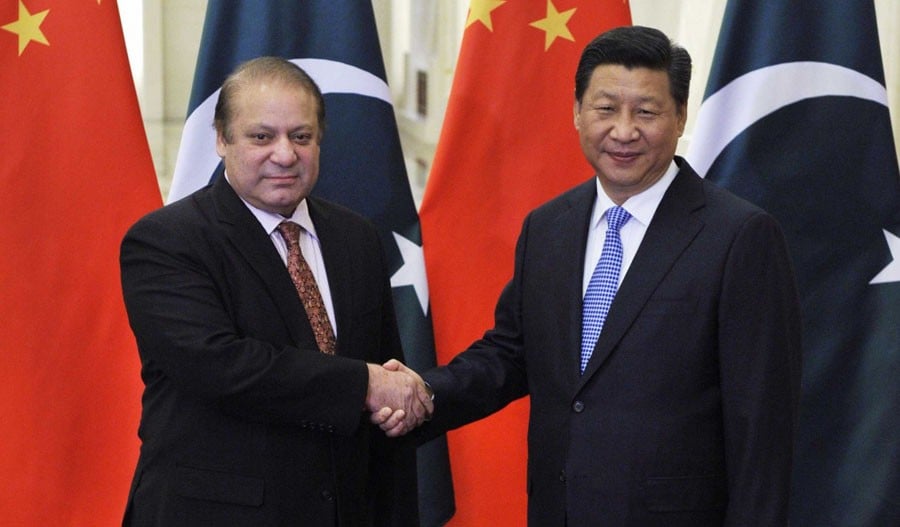
Pak-China relations is nothing more than a convergence of interests

China’s recent blocking of a US-led move to designate Masood Azhar, the head of the Jaish-e-Muhammad militant group and the alleged mastermind of the Pathankot attack, as a global terrorist has once again brought into focus the key role Beijing plays in safeguarding Pakistani interests on the international stage.
At the same time, it is a commonly held belief amongst security analysts that Pakistan’s detention of Hafiz Saeed, chief of Jamaat-ud-Dawa and alleged co-founder of the militant group -- Lashkar-e-Taiba -- was done, not to appease the new US administration, but under Chinese pressure, as a fragile relationship between New Delhi and Islamabad would divert the attention and focus needed to push forward the China Pakistan Economic Corridor (CPEC).
In both cases, the common denominator is Beijing. However, there are differing views on the extent and nature of China’s influence on Pakistan with regards to the latter’s foreign policy and whether it is direct influence or just mere convergence.
"China hasn’t traditionally looked to influence Pakistan’s foreign policy and when it has done so, it has typically been with reference to very specific and narrow Chinese interests," says Andrew Small, author of the book, The China-Pakistan Axis: Asia’s New Geopolitics. "China’s approach is not usually to attempt to exert direct short term pressure but to lay out its own position with the expectation that Pakistan will take its close partner’s views and interests into account as it thinks through its own policy."
Read also: ‘Do more’ and more
Still, all foreign policy is dictated by national interest, and in the case of Beijing and Islamabad, a convergence of these interests. At its core was, and is, India. "Both countries see India as a rival, though on very different levels, and in very different contexts," says Michael Kugelman, Deputy Director and Senior Associate for South Asia, at the Woodrow Wilson Center, in Washington. However, "Beijing does not consider New Delhi an existential threat -- far from it -- and in fact it seeks workable relations with India, particularly on the economic front."
In any event, with the advent of CPEC, the traditional strategic nature of Pakistan’s relationship with China added a new dimension: economics, and by association, security -- and this is perhaps where the line between convergence and influence becomes murky.
According to Small, the new Chinese position now includes the security conditions under which Beijing believes that CPEC can successfully move forward. "Beijing has a weightier voice on various issues today than it did even a few years ago," he says. Still, it has been unable to get Pakistan to crack down on all types of militants, and not just those that attack Pakistan, and by extension, China.
"What’s particularly concerning for Beijing is that many of the recent terror attacks in Pakistan have occurred along or near CPEC routes, and particularly in Balochistan," says Kugelman. "China is wise enough to realise that terror groups like the JeM, which aim their guns at India and not Pakistan, can still pose a threat to Pakistan and China given that all Islamist groups in Pakistan are cut from the same cloth."
Hence, Kugelman claims, "I wouldn’t be surprised if Beijing has quietly pressured Pakistan to take a stronger stand against all terror groups on its soil."
The United States has long applied the same pressure, but to no avail.
International relations cannot be seen in black and white, but in many shades of grey. In the same vein, the Beijing-Islamabad connection cannot be understood without bringing in Washington, and the new Trump administration.
While Pakistan continues to be a US ally, the signals so far are that the relationship is headed for change. At the same time, while China and the US continue to face off in East Asia, they have largely cooperated in the south Asian region -- Afghanistan being a case in point. "If the US-China relationship becomes entirely zero-sum in nature, that relatively benign environment (in South Asia) is unlikely to persist and Pakistan would have to navigate a more adverse set of geopolitical conditions for its partnership with Beijing," says Small.
This zero-sum situation though, is unlikely. "He (Trump) has indicated a desire to lighten the US footprint in the broader Asia region, and he’s already taken a step in the direction by withdrawing from the Trans-Pacific Partnership (TPP)," says Kugelman. "A less present America in Asia would be a big boon to China, and by extension for Islamabad, which could see its top regional ally strengthened in a big way."
And in the rare chance the zero-sum situation happens, Pakistan has been there before. "China is a far more capably ally than it was in previous decades," says Small.
Then there’s New Delhi. As mentioned earlier, one of the earliest points of convergence between Beijing and Islamabad had been the containment of India, albeit for completely different reasons. The Pakistani establishment sees India as a strategic, existential threat, whereas from Beijing’s point of view, India is competition for regional superiority. However, to China, there are few economies as attractive as the Indian market.
According to Kugelman, Pakistan views the China-India relationship very practically. "It understands that China is a rapidly growing economy and needs as many markets as it can find," he says. "From Islamabad’s perspective, there’s no reason to believe that China-India relations will pose a threat to Pakistan -- or the greater China-Pakistan relationship."
Today, in Pakistan, CPEC is "the" thing. It fits China’s grand ambition in the region, and creates a fantastic opportunity for rapid economic growth inside Pakistan, which given the state of the domestic economy, would not be possible otherwise. It is nothing more than a convergence of interests.